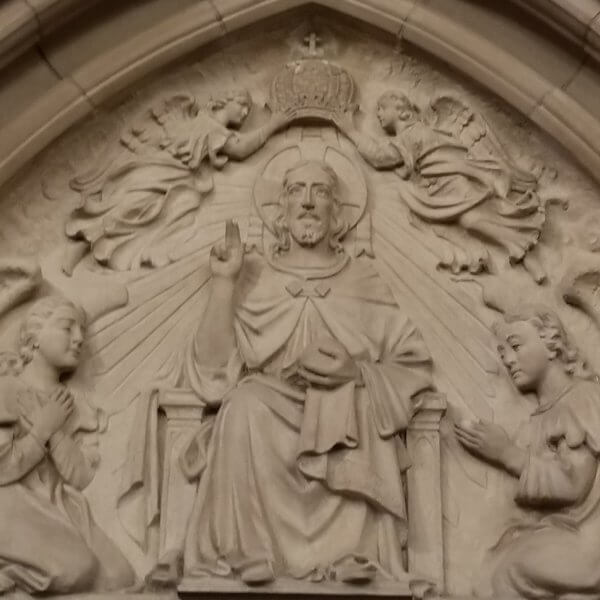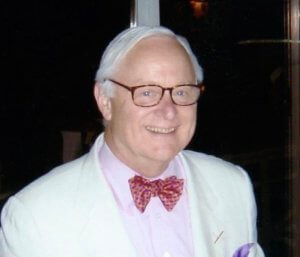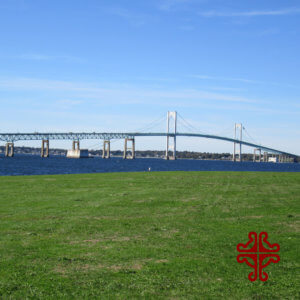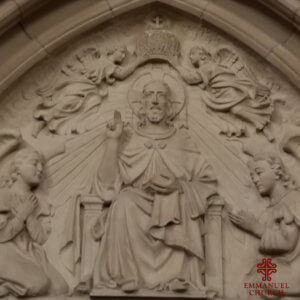
Finding Jesus

Each time I return to RI, a flood of memories comes over me. As a youngster I remember summer weekends in Weekapaug. As a navy flyer I served the better part of four years at Quonset Point. I have fond memories of girls loved and lost in Newport, the last ferry back to Jamestown on Saturday night, lobster rolls, fishing off Point Judith.
What I remember most is water. Water is everywhere. Most days, it is beautiful. Some days, in times of low cloud and Nor’easters, the surface of Narragansett Bay turns dark, threatening, with whitecaps. Some of you this morning carry living memories of the devastation of September, 1938. Water is everywhere. In Rhode Island you are either on the water, admiring the water, or figuring how to get around the water, particularly if you are headed over to Little Compton. Natives cautioned me not to get in the water until those final days of August!
Water is central to the life in the dry, hot country of Israel. We find water mentioned over 500 times in the Bible. In Genesis, God’s breath sweeps over the face of the waters as God gives birth to a new creation. Water becomes the source of life for all that live in it and for all whose life depends upon it. Out of Eden flows the river of life as it waters the garden and forms four branches to water the life of all God’s people. The river of life flows on through the stories of the Hebrew Scriptures, finally resurfaces at the end of the Book of Revelation.
In this season of Lent, Jesus comes to us in the opening words of the Gospel of John.
The true light, which enlightens everyone, was coming into the world. 10 He was in the world, and the world came into being through him; yet the world did not know him. 11 He came to what was his own,[c] and his own people did not accept him.
John’s gospel presents Jesus as a mystery. He is the Word, he is the Light, he is Life. Last Sunday, Nicodemus struggles, but fails to understand. He walks away from his interview with Jesus, confused. He is told he must be born again, born of water and the spirit if he is to find the Kingdom of God. He doesn’t get it.
Jesus in Samaria
This morning, a little further on in his ministry, Jesus arrives in Samaria on his way north to Galilee. Samaria is foreign territory, traditionally hostile to the Jews. The Samaritans are ethnically different. They worship different gods on their own mountain, not at the Temple in Jerusalem. Samaria lies north of Jerusalem and blocks the direct path to Galilee. A Jew traveling to Galilee from Jerusalem might dogleg east across the Jordan to avoid entering Samaria. Today, Jesus, a Jew, does not avoid Samaria. He travels directly to Jacob’s well, directly to the heart of Samaritan tradition.
Jesus sits by the well at noon. After a dusty journey on foot that morning, he rests in the heat of the day, alone. A Samaritan woman approaches. She comes to draw water at high noon, rather than in the cool of the evening. She avoids the women in town who come to the well in the evening or early morning. We learn that our woman has had five former husbands and is now living with another, outside of marriage. She is an outcast of the social community.
However this woman knows her own mind. We cannot know, but perhaps she is too smart, too competitive, too demanding for her former husbands. Her feisty personality is on display today. She is a worthy debate partner for Jesus. She is a lot sharper than Nicodemus, a Pharisee and learned member of the Jewish religious authority in Jerusalem. Their version of a Yale graduate.
Jesus is thirsty. He says to her “give me a drink.’ She pushes right back: ‘how is it that you, a Jew, ask a drink from me, a woman of Samaria?’ Both are now well outside their social code. Jewish men travel together. Jesus, a Jew, should not engage with a woman, certainly not a Samaritan woman. Certainly not an unmarried woman. Equally, she, a Samaritan, should not be in contact with a Jew.
Initially, the woman is puzzled. She doesn’t know who Jesus is. She does not understand how Jesus is able to offer his living water. He brings no water jar and the well is deep. “Where do you get that living water? Are you greater than Jacob, the patron of this well, and the long line of his descendants who have tended to it?” Responding, Jesus discloses the gift of God in the mystery of living water. He needs no water jar for a deep well, his living water comes from above. He tells her that those who drink from Jacob’s well will thirst again. “The living water I offer will become a fountain that will gush up within all who drink of it and offer eternal life.”
Recognizing Jesus as the Messiah
The woman now recognizes Jesus as the Messiah. Here is the savior she has long awaited who will proclaim the truth. Now, to one who seems least likely, Jesus confirms he is the Messiah. He tells the woman that her people shall no longer worship their unknown god on their own mountain. They shall join with all peoples everywhere, to worship the spirit and the truth. The Samaritan woman gets it and departs to take the news to her community, fulfilling Jesus’ prophesy.
In rushing off, the woman leaves her empty water jar behind. Perhaps she no longer needs earthly water. Perhaps the water jar will just slow her down. Perhaps it is a sign of discipleship, like the fishermen who immediately leave their nets to follow Jesus. With no concern of rejection, this outcast woman of Samaria approaches the men of Sychar and announces: “come and see this man!’ The Samaritans immediately take her seriously, they return with her to Jesus and recognize him as the Savior of the world.
Later, St. Paul will claim to be the apostle to the Gentiles. As Gentiles, the Samaritan men come to Jesus on the strength of her word. In John’s gospel, it is the Samaritan woman who is first to be an apostle to the Gentiles.[1]
Finding Jesus in Unlikely Places
So often, Jesus is found where we don’t expect to find him. The Samaritan woman was waiting for the Messiah, she was ready to receive the Messiah. Yet face to face with Jesus, she fails to recognize him. She has gone to the well, purposely intending to avoid everyone. She meets an unknown Jewish man who breaks the social code by speaking with her. Even more unlikely, the man speaks openly to her, a fallen woman of low caste. In this most unlikely encounter, she finds the Messiah she has been longing for.
And so it goes. Jesus comes to us in the most unlikely places and we do not recognize him. At the empty tomb, Mary Magdalene thinks she is speaking with the gardener. As he speaks, Mary recognizes the risen Christ. (Jn 20:15) Later that day, two disciples walk in the late afternoon on the road to Emmaus. A third traveler catches them up and walks with the disciples for a while. The traveler tells them about the events on Calvary and remains for supper. As the unknown traveler takes bread, blesses and breaks it, they recognize him …and Jesus vanishes from their sight. (Lk 24:15-31) Early the following morning, seven disciples are fishing by the Sea of Tiberius. They have caught no fish that night. A man calls at them from the beach, tells them to cast their nets to the right side of their boat. They catch so many fish they struggle to bring their heavy nets to the shore. There they break bread with the man they now recognize as Jesus, who will tell them of their future after he is gone. (John 21) In each of these encounters, Jesus brings the Word of God to those he meets.
We find Jesus in the most unlikely places. An elderly priest tells this story on himself. A short man, he has been waiting in a line at a butcher’s counter. Normally a fun-filled personality, he has had a hard day. He is in a troubled, dark mood, the fun has left him. As he approaches the counter, expecting to take his number, a very tall man reaches over his shoulder and snatches the number that should have been his. The priest turns to the man in fit of anger. The tall man beckons him and says “sir, here is your ticket.” In so many small and entirely unexpected ways, Christ finds us.
Never have we, as a nation, sought the presence of Christ more than today. We are a people struggling to make sense out of a world that has turned upside down. Our news is filled with constant warnings of what we must do to survive the impending health crisis. We grieve for those already lost to the death that stalks us by day. We fear for our jobs, our economic security, the safety and well-being of loved ones. We fear for the economic well-being of our nation. We fear for the security of our borders. We question if we can trust those in authority. In a nation so divided politically, divisions are deepened by those who identify the source of our troubles as ‘those Asians,’ or ‘a CIA initiative gone wrong.’ We fear for the millions of at-risk migrants who face even greater barriers on their journey to find a new life. How do we find God when we are adrift on a stormy sea of such fear and uncertainty?
In Lent we travel a forty-day personal journey of fasting and prayer to bring us to Christ. Lent is the gift of time to put aside the busy-ness of life and prayerfully ask: where is God in my life? It is a time to reach out for God to relieve the our fear and suffering, to give us confidence and restore hope. Our fear is real, but this is not the first time we as a nation have been put to the test. St. Paul is a man well acquainted with suffering. In his letter to the Romans today, he reminds us that suffering produces endurance, endurance produces character, character produces hope…and hope for God’s grace through the Holy Spirit will not disappoint us.
As we conclude our Lenten journey, it is on the cross Jesus that shows us the way. In his final moments, Jesus cries the first words of the 22nd Psalm: “my God, my God, why have you forsaken me?” Yet at the moment of greatest suffering Jesus does not lose faith. He cries out MY God, MY God. He has not lost faith, only a loss of contact.[2] The psalm he speaks continues and concludes with words of confidence in his God. In Christ we find the example of hope that will sustain us through this time of suffering and uncertainty and bring us to the grace of God.
As we move through our Lenten time together, I offer a prayer, a hymn for guidance during the coming days:
Spirit of the living God, fall afresh on me.
Spirit of the living God, fall afresh on me.
Break me, melt me, mold me, fill me.
Spirit of the living God, fall afresh on me. Amen.[3]

Acknowledgement
This is a homily delivered to a congregation at Emmanuel Church, 4 Dearborn St. Newport, RI on March 15, 2020. I am indebted to J. Ramsey Michaels for his insights into the lectionary for the day, as presented in The New International Commentary on the New Testament – The Gospel of John (Eerdmans, 2007), pp. 229-270; Roger C. Bullard, March 15, 2020
[1] J. Ramsey Michaels, The New International Commentary on the New Testament – The Gospel of John (Eerdmans, 2007), p. 270
[2] RT France, The Gospel of Matthew, Eerdmans, 2007, p. 1077
[3]Attributed to: Daniel Iverson (1890-1977) a native of Brunswick, Ga. Education: University of Georgia in Athens; the Moody Bible Institute in Chicago; Columbia Theological Seminary in Decatur, Ga; and the University of South Carolina. A Presbyterian minister, Iverson served congregations in Georgia, South Carolina and North Carolina. In 1927 he organized the Shenandoah Presbyterian Church in Miami, Fla where he remained until his retirement in 1951.
